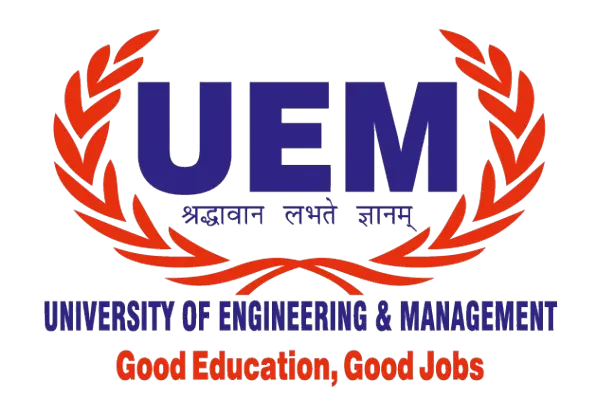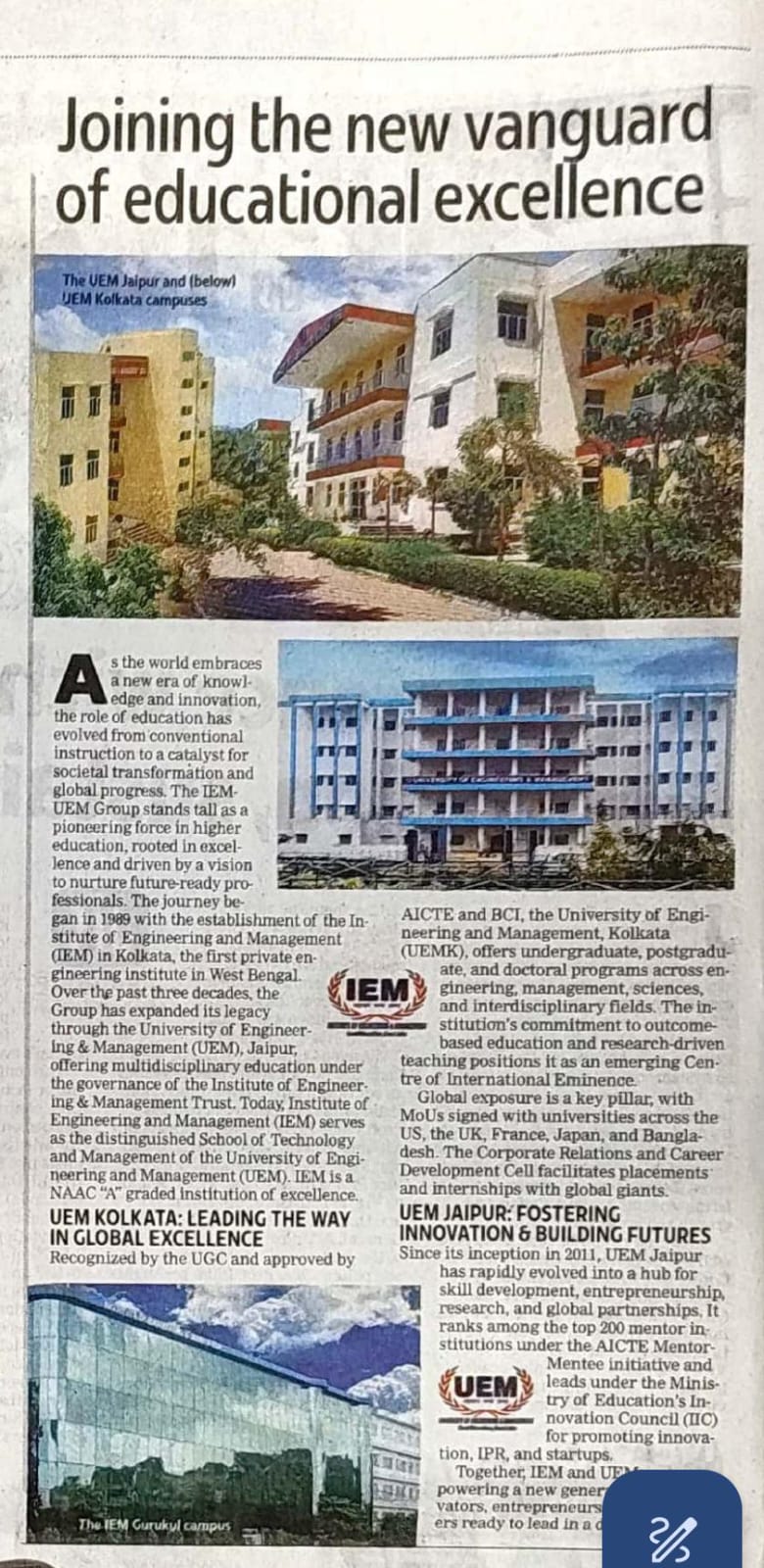University of Engineering and Management Kolkata
Department of Computer Science and Engineering (IoT, CS, BT)
Department of Computer Science and Engineering (Internet of Things, Cyber Security, Blockchain Technology)
About Us
The Department of Computer Science & Engineering (Internet of Things, Cyber Security, Blockchain Technology), commonly referred to as CSE (IoT, CS, BT), is among the most innovative and advanced engineering departments at the Institute of Engineering and Management, Newtown. Established in the academic year 2020–2021, it operates under the auspices of the University of Engineering and Management, Kolkata. The primary objective of this department is to impart essential concepts such as computational thinking, object-oriented programming, data structures, algorithms, machine learning, deep learning, database management systems, artificial intelligence, Internet of Things, Cyber Security, Blockchain Technology, Natural Language Processing, and Python programming for effective problem-solving. Consequently, students will gain a comprehensive understanding of Internet of Things, Cyber Security and Blockchain Technology by applying their knowledge to real-world challenges across various application domains, including Data Analytics, Cloud Computing & IOT, Network Security & Cryptography, Cyber Security, Human Computer Interaction, Quantum Computing and more.
Vision
To be a leading center of excellence in Computer Science & Engineering, specializing in the Internet of Things (IoT), Cyber Security, and Blockchain Technology, by fostering innovation, research, and high-quality education that empowers students to solve complex real-world problems and contribute to the development of secure, connected, and sustainable technological ecosystems.
Mission
-
Mission 1:
Comprehensive Education: Deliver an interdisciplinary curriculum that provides students with a strong foundation in IoT, Cyber Security, and Blockchain Technology, preparing them to excel in industry and tackle modern challenges.
-
Mission 2:
Pioneering Research: Foster innovation and advanced research in IoT, Cyber Security, and Blockchain, empowering students and faculty to explore emerging technologies and develop impactful solutions that improve security, connectivity, and efficiency across various sectors.
-
Mission 3:
Industry Engagement: Establish strategic partnerships with industry leaders to offer students hands-on experience, keep them abreast of the latest technological trends, and facilitate the application of their knowledge to practical scenarios.
-
Mission 4:
Ethical Leadership and Social Impact: Cultivate a sense of ethical responsibility and social consciousness in students, ensuring they use their expertise to contribute to societal well-being and address global issues through IoT, Cyber Security, and Blockchain Technology.
-
Mission 5:
Continuous Learning and Growth: Promote lifelong learning and professional development, equipping students to stay adaptable and relevant in the rapidly changing technological landscape.
Program Educational Objectives
-
PEO 01: Excellence in engineering design and development work
Graduates of the program will apply their expertise in computer science and engineering to proficiently recognize and address substantial challenges across diverse application domains.
-
PEO 02: Real Life solution of everyday problem
The objective is to enhance students’ proficiency in the core principles of computer science, engineering, and related engineering disciplines, enabling them to comprehend engineering trade-offs and to analyze, design, and synthesize technical concepts and data. This foundation will empower them to create innovative products and solutions that address real-world challenges.
-
PEO 03: Leadership
Graduates of the program will embark on successful careers in both business and academia, ascending to influential roles that enable them to effect positive change within their communities, organizations, and professional fields.
-
PEO 04: Continuous Learning
Graduates of the program will possess the ability to adapt to contemporary tools, techniques, and strategies, ensuring they remain at the leading edge of artificial intelligence, machine learning, and the fields of computer science and engineering, thereby equipping them to address the challenges of a competitive landscape.
Program Outcomes (POs)
-
PO 01: Technical expertise in engineering
Utilize the principles of mathematics, scientific concepts, engineering fundamentals, and a specific area of engineering expertise to address intricate engineering challenges.
-
PO 02: Problem assessment
Recognize, articulate, investigate relevant literature, and evaluate intricate engineering challenges, arriving at well-founded conclusions based on fundamental principles of mathematics, natural sciences, and engineering disciplines.
-
PO 03: Solution design and development
Design solutions for intricate engineering challenges and create system components or processes that address the defined requirements, while giving due regard to public health and safety, as well as cultural, societal, and environmental factors.
-
PO 04: Perform investigations into complicated problems
Utilize knowledge derived from research and employ research methodologies, which encompass experimental design, data analysis and interpretation, as well as the synthesis of information, to draw valid conclusions.
-
PO 05: Utilization of modern tools
Develop, choose, and implement suitable methods, resources, and contemporary engineering and IT instruments, including forecasting and modeling, for intricate engineering tasks while being aware of their limitations.
-
PO 06: Engineer’s role in society
Utilize contextual knowledge to evaluate societal, health, safety, legal, and cultural matters, along with the associated responsibilities pertinent to the field of professional engineering.
-
PO 07: Ecological considerations and sustainable practices
Recognize the influence of professional engineering solutions within societal and environmental frameworks, and exhibit an understanding of, as well as the necessity for, sustainable development.
-
PO 08: Ethics
Adhere to ethical principles and dedicate oneself to the professional ethics, responsibilities, and standards inherent in the field of engineering.
-
PO 09: Individual and collaborative work
Demonstrate proficiency both as an individual contributor and as a participant or leader within diverse teams and multidisciplinary environments.
-
PO 10: Communication
Engage proficiently in intricate engineering endeavors with both the engineering community and the broader society. This includes the ability to understand and produce comprehensive reports and design documentation, deliver impactful presentations, and provide as well as receive unambiguous instructions.
-
PO 11: Project supervision and financial management
Exhibit a comprehensive understanding of engineering and management principles, and effectively apply this knowledge to personal work as both a team member and leader, in order to oversee projects within multidisciplinary settings.
-
PO 12: Continuous learning
Acknowledge the necessity for, and possess the readiness and capability to participate in autonomous and continuous learning within the extensive framework of technological advancement.
Program Specific Outcomes (PSOs)
-
PSO 01: Technical expertise and evaluation
Understand and evaluate particular engineering challenges related to communication, networking, electrical and electronic circuits, signal processing, computer programming, embedded systems, VLSI design, and semiconductor technology by utilizing knowledge from fundamental sciences, engineering mathematics, and core engineering principles.
-
PSO 02: Planning and implementation
The capability to effectively design and apply the acquired technical knowledge, demonstrating proficiency in logical programming for use in electronics and communication engineering applications.
-
PSO 03: Enhancement of professional skills and professional ethics
The capacity to engage in effective communication, coupled with outstanding professional competencies, while upholding the principles of professional ethics for the betterment of society.
Students’ Learning Outcomes
- The ability to identify, articulate, and address complex engineering challenges through the utilization of scientific, mathematical, and engineering principles.
- The ability to employ technical design in order to develop solutions that meet specified requirements, while also considering international, cultural, social, environmental, and economic factors, along with public health, safety, and welfare.
- The ability to engage and communicate with a diverse range of individuals.
- The ability to recognize ethical and professional responsibilities within engineering environments and to make informed decisions that consider the implications of engineering solutions on social, economic, environmental, and global contexts.
- The ability to effectively collaborate within a team, where members alternate leadership roles, promotes inclusivity and teamwork, establishes objectives, coordinates tasks, and accomplishes assignments.
- The ability to formulate and execute appropriate experiments, evaluate and interpret data, and make informed decisions based on engineering principles.
- The ability to employ appropriate learning methods to obtain and utilize new information as required.











